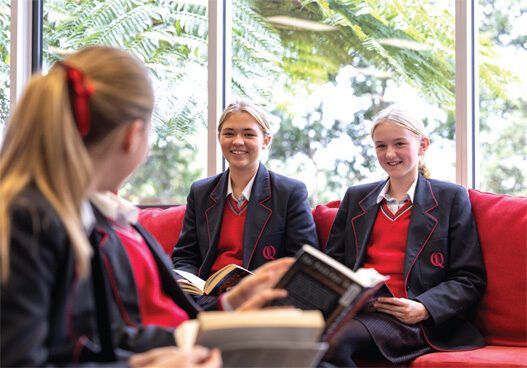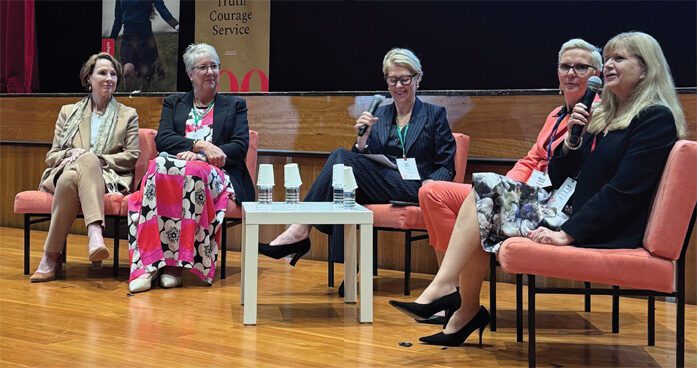The recent Educating Girls Symposium attended by educators from private girls schools across Australia was a day of leadership and learning. But why is there a need for discussion about girls’ education?
Bustling around a mechanic workshop in overalls, tinkering on a vintage 1975 Suzuki Carry ute, is a group of Year 8 to 12 Queenwood School for Girls students who, over the past three years, have successfully turned this derelict car into a road-ready electric vehicle, which will serve as an eco-friendly runabout on the school campus.
The co-curricular QUTE project has seen the students completely rebuild the vehicle from the chassis up, apart from structural welding, metal cutting and EV power link- up for safety reasons. It’s part of Queenwood’s advanced technologies and engineering programs.
Marise McConaghy, Queenwood principal, says the initiative builds on skills which are developed in the curriculum, immersing the students in problem-solving. “We had a girl who had been involved in the program at the school, who was inspired to go on and do engineering,” says Marise. “She (said) she felt quite advantaged by her experience at school in this program.”
The student entered the first year of her degree feeling ‘very confident’ as, through the QUTE project, she’d developed strong problem-solving and teamwork skills.
The QUTE project was just one of many initiatives on display at the Educating Girls Symposium, held at Queenwood in Mosman. Hosted by the International Coalition of Girls’ Schools (ICGS) in April, the symposium was attended by over 400 educators, school leaders and experts in girls’ education.
Key issues in girls’ education like leadership and social media harms were discussed at the event, with keynote speakers including Warringah MP Zali Steggall, clinical psychologist Danielle Einstein and Loreto Kirribilli principal Nicole Archard.
Marise is a board member of the ICGS, an advocate for girls’ education worldwide. “The ICGS comprises of 24 countries, more than 550 schools and over 300,000 students,” Marise says. “We share the same purpose, which is to educate girls in a dedicated and very targeted way.”
The symposium was a chance for attendees to network, exchange ideas and collaborate on initiatives, says Loren Bridge, ICGS regional executive director. “At their heart, girls’ schools are places of leadership. Places where community and collaboration, agency and self-efficacy flourish,” Loren says. “But most of all, girls’ schools are places of incredible innovation, and this is what (was) shared at the symposium.”

Queenwood girls join in all aspects of school life
But why is there a need for a specialist discussion around girls’ education? It seems the business of teaching girls is its own specialist area, with research cited by ICGS showing that all-girl learning environments are better able to capitalise on girls’ unique learning styles: providing support and actions geared towards success.
Marise agrees, saying research shows that girl-only schools achieve better results academically, with students from these schools having higher confidence levels and greater participation in STEM, sport and debating.
“I think in a girls’ school environment (students) have the courage to take more risks. To play a sport they don’t think they will be good at; to go on a debating team even if they’re a bit shy; to take part in a play; to put up their hand to try and solve a math problem or to do physics,” Marise explains. “So they’re participating in every aspect of school life. They don’t have to share it with the boys. They’re all leaders.

Principal panel: Marise McConaghy, Queenwood; Julia Davidson, Wellington Girls College NZ; Jane Danvers, Kambala; Nicole Archard, Loreto Kirribilli and Megan Krimmer, Abbotsleigh
“They’re participating in every aspect of school life. They don’t have to share it with the boys. They’re all leaders.” Marise McConaghy, Queenwood principal
“The whole school is dedicated and has expertise in the education of girls. We intentionally put role models in front of them – girls’ schools are generally run by women.
“We see our job as developing young women so that they can go out into the world and take their place in whatever way they want that to be,” Marise says.
In fact, research cited by ICGS shows that girls’ school graduates are six times more likely to consider taking math, science and technology subjects compared to their co-educated peers; and 80% have held leadership positions since graduating high school.
Sharing tips on ways to inspire young leaders at the event was guest speaker Warringah MP Zali Steggall, who shared a conversation with Nicole Archard, principal of Loreto Kirribilli about the ‘invaluable role girls’ education plays in shaping the leaders of tomorrow and closing the gender gap.’
“I spoke about the importance of instilling confidence in girls and encouraging them to back themselves – to pursue leadership, speak up and take their seat at the table,” Ms Steggall says.
While the day focused on building girls’ confidence, it also highlighted the damage that social media is doing to their self-esteem. Clinical psychologist and researcher Danielle Einstein spoke on the primary harms of social media in girls.
“Our misuse of technology is fuelling a mental health crisis. It’s time to step up with education, leadership and real change. Schools have led the way with phone bans and they can lead the next steps for our youth armed with a clear understanding of what is needed for mental health,” Dr Einstein says.
An adjunct fellow at Macquarie University, Dr Einstein is a key advisor to governments on social media use and has co-written a book with Dr Judith Locke called Raising Anxiety: Why our good intentions are backfiring on children (and how to fix it).
“It’s actually about us recognising how addictive social media is and how much in youth it leads to a real self-focus: ‘A focus on me, a focus on what other people think of me, a focus on my appearance,’” Dr Einstein says.
“And we know that addictive use effects attention, impacts brain development and also harms emotional development.
“I’d say for mental health, I don’t see any benefits in social media use. If there are small, minimal, even if there were to be some, they are so outweighed by the harms, especially in this age group, in teens under 16.”
Queenwood’s junior school banned smartphone use earlier this year, with parents creating their own group, Queenwood Unplugged, to support each other in keeping their daughters phone-free. “I think schools and families have to work together, which is why the example of the junior school is such a good one,” Marise says.
While the ever-growing issue of social media use is a tough one for schools to grapple with, it seems that schools within the ICGS are doing all they can to build student confidence, leadership, critical thinking and to support their learning in an increasingly innovative environment – encouraging them, most of all, to join in. Or, as Ms Steggall puts it: “If you’re not at the table, you’re on the menu.”








